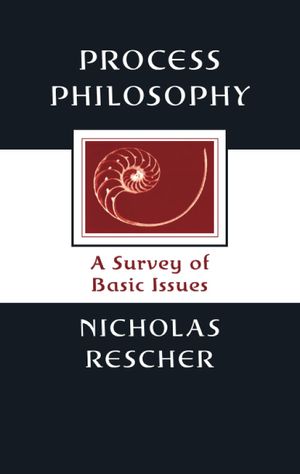
Process Philosophy: A Survey of Basic Issues
by Nicholas Rescher
read in Mar 2020
book info on goodreads
Rescher in his book “Process Philosophy - A Survey of Basic Issues” develops a pragmatist view of process philosophy that also extensively draws from Whitehead’s ideas. Rescher starts his introduction into process philosophy by describing the ontological substance bias that permeates Western philosophy. He refers to the root of this bias as the process-reducibility doctrine according to which processes are simply the doings of substantial agents and thereby derivative. Every action must have an actor and every event is the outcome of the agency of such actors. Thus, this view does not question the existence of processes but downgrades their significance compared to substances.
“A process is an actual or possible occurrence that consists of an integrated series of connected developments unfolding in programmatic coordination: an orchestrated series of occurrences that are systematically linked to one another either causally or functionally. Such a process need not necessarily be a change in an individual thing or object but can simply relate to some aspect of the general condition of things.”
Process thinking does not deny that there are some processes that relate to the doings and undergoing of beings or even the collective action of actors. However, process thinking also opens the possibility for processes that are subjectless.
“Not stable things, but fundamental forces and the varied and fluctuating activities they manifest constitute the world. We must at all costs avoid the fallacy of materializing nature.”
Rescher proposes four basic principals underpinning his process philosophy:
- Change, emergence, novelty, creativity are among the principal meta-physical categories
- Process is a principal ontological category
- Processes are more fundamental than things as ontological categories
- All major elements of ontological description are better understood in process terms
An interesting argument for process thinking that Rescher brings forward showing his pragmatist approach to process thinking is based on this significance or autonomy of process and things. A substance ontology cannot work without processes due their epistemological importance. Substances remain inherently unknowable without processes. A process ontology on the other hand allows for processes without a connection to substances.
“A process ontology thus greatly simplifies matters. Instead of a two-tier reality that combines things with their inevitable coordinated processes, it settles for a one-tier ontology of process alone.”
If one where to look for a simple ontology, process philosophy has a lot to offer.
There are two ideas that are core to Rescher’s book and that are also to some degree distinct in his line of thinking. The first focal idea of his process philosophy is the notion of “unowned” processes that are not associated with change in an individual person or thing. Unowned processes are free-floating and are different from owned processes in that they do not represent the actions of actual beings. For example, systemic change such as a change in temperature or a decline of the purchasing power of money are processes that are simply related to some aspect of the general condition of things.
The second important idea of Rescher’s writing is the idea of hierarchies of processes. In this aspect he differs from other process theorists such as Mesle, who take a flat perspective toward process and do not engage with the idea of hierarchies of process. Rescher instead discusses how processes always consist of a variety of subordinate processes or what Whitehead calls a “nexus” of process. This complexity of process goes in two directions: inward and outward. Processes form part of a wider structure and at the same time have an inner structure consisting of micro-processes.
Where Rescher gets very close to Tim Ingold’s view of flowing lines of action is the proposition of how beings are becoming in process. It is not the present properties of a process that make a being but rather the history of a process; the temporal quality of its descriptive unfolding (or flowing) across time.
In Rescher’s view processes have patterns and periodicities. Processes are always of a certain type that share a commonality of structure. Again, similar to Mesle, Rescher shows how this idea of process patterns aligns well with the understanding of modern physics and quantum theory according to which there are no substances but only patterns of process that exhibit temporary stabilities.
“The quantum view of reality demolished the most substance-oriented of all ontologies—classical atomism. For it holds that, at the microlevel, what was usually deemed a physical thing, a stably perduring object, is itself no more than a statistical pattern, that is, a stability wave in a surging sea of process.”
Finally, Rescher also provides an interesting overview of the process philosophical movement at large. Specifically, he describes how process philosophers, although united in thematic approach, differ in their opinion of what types of process are most important. For example, he argues that Bergson was focusing on organic and biological processes, James based his ideas on psychological processes and Whitehead emphasized physical processes, whereas Dewey developed a more sociocultural process philosophy.